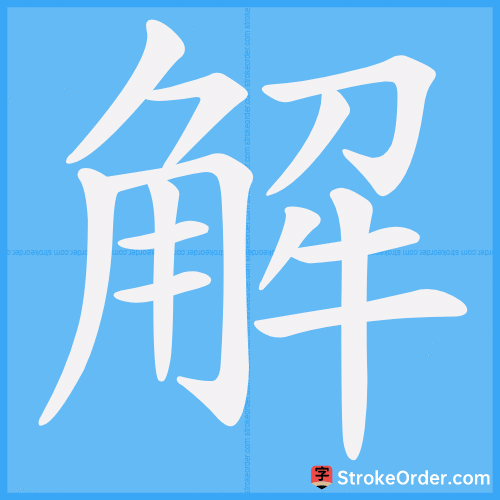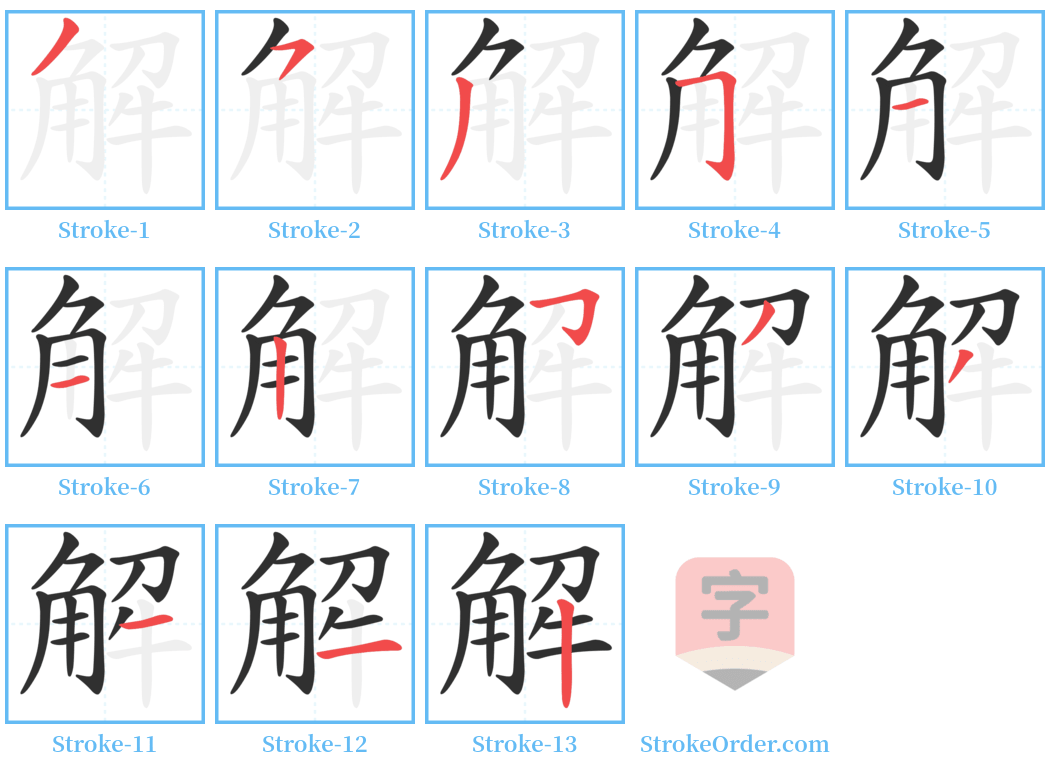解 Stroke Order
Animated Stroke Order of 解

Stroke Order Diagrams for 解

Step-by-Step Handwriting Guide for 解

Learn to Write Chinese Characters with Video Tutorials
Watch the video of writing the Chinese character "解", learn the correct stroke order (笔顺) of the character "解", and master the standard way of writing the character "解".
Free Printable Handwriting Practice with Stroke Order: 解
Printable Writing Practice Worksheet of "解" in Portrait Orientation (Tian Zi Ge)

Printable Writing Practice Worksheet of "解" in Landscape Orientation (Tian Zi Ge)

Information of 解
Pinyin
jiě、 jiè、 xiè
Radical
角
Strokes
13 strokes
Usage
★★★★★
Definition
to separate / to divide / to break up / to loosen / to explain / to untie / to emancipate, transport under guard, (surname)
解 [jiě]
(verb)
1. To dissect, to cut open.
2. To separate, to split apart.
3. To remove, to eliminate, to abolish, to stop.
4. To dissolve.
5. To explain clearly, analyze, clarify.
6. To understand, to grasp.
7. To mediate, to balance, to handle.
8. To feel happy, to be joyful.
9. To excrete.
10. The value of an unknown in an algebraic equation.
11. To solve or compute an equation.
12. A type of literary style, such as in the works of Han Yu.
解 [jiě]
(verb)
1. Same as the original meaning.
2. To dissolve or resolve into parts.
3. To clarify or analyze.
4. To detach or liberate.
5. To loosen or untie.
6. To interpret or explain.
7. To comprehend or know.
8. To remove or take off.
9. To open up or make accessible.
10. To mediate or resolve conflicts.
11. To relieve oneself (defecate or urinate).
12. To alleviate or ease.
13. Auxiliary verb indicating ability or possibility.
解 [jiě]
(noun)
1. A form in literary style.
2. The solution to an algebraic equation.
3. In Daoism, the idea that the soul separates from the body after death to become immortal, referred to as "corporeal dissection."
4. Insight, understanding.
解 [jiè]
(verb)
1. To transmit or send.
2. To escort assets or criminals.
解 [jiè]
(verb)
1. Same as the original meaning.
2. In ancient times, referred to the practice of recommending scholars for examination.
3. To escort property or criminals.
4. To mortgage by pledging an item.
5. To exchange (currency).
解 [xiè]
(noun)
1. A name for a mythical creature.
2. A place where officials conduct business (local authorities).
3. In ancient times, it referred to various acrobatic skills, particularly those performed on horseback.
4. An ancient geographical name referring to a town.
5. A surname.
解 [xiè]
(verb)
1. To relax or become slack, to lose diligence.
2. Additional references can be found under jin [jiě] and jiè.
解 [xiè]
(noun)
1. A name for a mythical creature.
2. A place where officials conduct business.
3. In ancient times, it referred to various acrobatic skills.
4. An ancient geographical name.
5. A surname.
解 [xiè]
(verb)
1. To relax, to be negligent in work.
2. Additional references can be found under jiě and jiè.
to settle (a dispute out of court) / to reconcile / settlement / conciliation / to become reconciled
to contribute generously (idiom); help sb generously with money / to give generously to charity
to liberate / to emancipate / liberation / refers to the Communists' victory over the Nationalists in 1949 / CL:次[ci4]
Input Method for 解
Pinyin
jie3
Wubi
qevh|qevg
Cangjie
nbshq
Zhengma
rlym
Four Corner
27252
Unicode
U+89e3
Same Pronunciation Characters